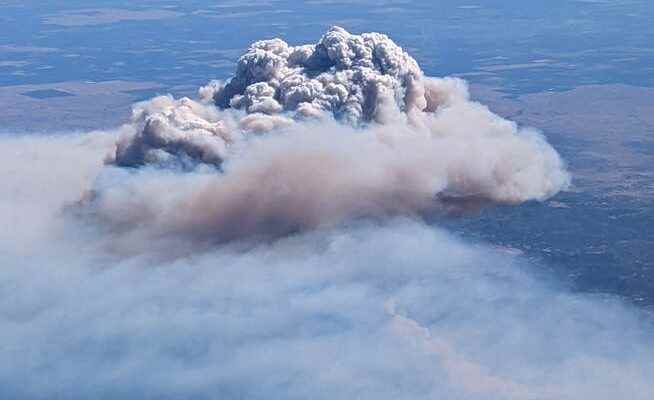Reorienting climate research towards an ominous future is superfluous. The demand to deal more with resilience seems to make more sense. She should be strengthened.
In the course of climate change, it is becoming drier in many regions. Then the risk of particularly intense forest fires increases. Here is an aerial view of a fire in Yosemite National Park on July 22, 2022.
Tens of thousands of climate and climate change research articles are published each year. They deal with every imaginable aspect. But eleven scientists now want to have identified a deficiency. They claim that worst-case scenarios are not sufficiently investigated.
“Could man-made climate change lead to a global societal collapse or even ultimately to human extinction?” According to the group led by Luke Kemp from the University of Cambridge, far too little attention has been paid to this question. With the “Proceedings of the National Academy of Sciences”, the journal of the American Academy of Sciences, they have a renowned medium for their claim found.
According to the research group, a major risk could emanate from a cascading intensification of climate change. Not only would ecosystems be damaged, but political conflicts and migration movements could also be intensified.
There are many studies with extreme assumptions
The researchers claim that the UN Climate Change Council has focused too much on the consequences of warming of 1.5 degrees or 2 degrees Celsius because these are the temperature limits in the Paris climate agreement. However, the consequences of a possible temperature rise of three degrees or more have been neglected. On the other hand, there is a culture in climate research that tends to understate rather than exaggerate the drama, so as not to be alarmist.
However, this representation is heavily distorted. The technical literature is teeming with studies that assume extremely high greenhouse gas emissions in the future. In the computer simulations, this results in strong warming and extreme consequences. Climate tipping points have been an important topic in research for decades. Recently, the danger of cascading extreme events has increased. All of these studies are included in the reports of the UN Climate Council.
But catastrophic developments were not a focus of the last climate report. And there are good reasons for that: scenarios with extremely high greenhouse gas emissions have recently been criticized because they are increasingly considered implausible.
Black painting in research is inappropriate
An example shows how one-sided the researchers around Kemp argue. They cite a study that describes the danger that a cloud type (stratocumulus) that is currently helping to cool the earth could dissipate in the future.
If the CO2concentration reached three times today’s level by the end of the century, this type of cloud could disappear. Then global warming would increase by eight degrees Celsius. That would indeed be catastrophic. But this scenario belongs in the realm of fantasy. Such a powerful CO2-Increase as assumed in this argument is unrealistic.
Kemp’s group expects three effects from increased research into catastrophic climate scenarios: it would promote climate policy measures that improve resilience and provide information that would be needed for measures such as emergency response.
‹›What is certain is that some of the institutes at which the authors of the call work would benefit from a reorientation of climate research towards pessimistic scenarios: Timothy Lenton from the University of Exeter is just as well known for work on tipping points as the Potsdam Institute for Climate Impact Research , on which the authors Johan Rockström and Hans Joachim Schellnhuber work.
However, climate research should not be excessively pessimistic. Your task is to paint a realistic picture without constantly squinting at the political consequences.
But one of the demands made by the group around Kemp is correct: it would be good if research were to focus more on all types of resilience. In other words, with all the measures that increase resilience to climate change. We will definitely need this knowledge.
